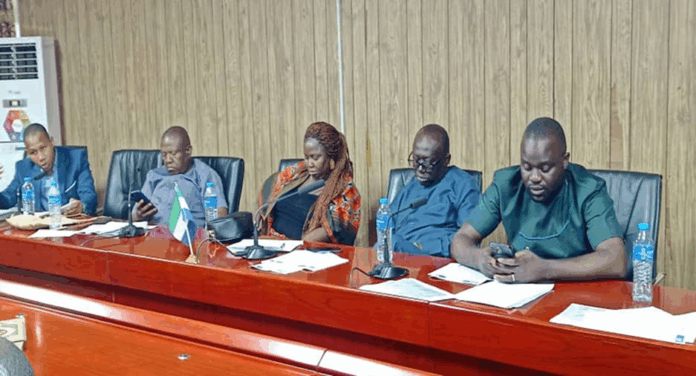By Shadrach Aziz Kamara
The Parliamentary Oversight Committee on Agriculture, Forestry and Food Security, chaired by Hon. Salieu Osman Sesay, has raised critical concerns over the Ministry of Agriculture’s handling of tractors, seed systems, and the nation’s push towards rice self-sufficiency.
Meeting with ministry officials in Parliament, Hon. Sesay emphasized that the committee has dedicated Friday to conducting a thorough field assessment of the ministry’s projects. He stressed that MPs continue to receive complaints from farmers regarding limited access to tractors and service providers, despite government’s investments.
Committee members questioned ministry representatives on several fronts, including the number of rice breeds currently cultivated, their tonnage capacity, and the actual progress of the 4,000-hectare rice cultivation project. MPs cited reports that only 1,000 hectares had been completed during initial monitoring visits.
Concerns were also raised over the status of soil surveys, the availability of certified seeds, and the role of private sector service providers in boosting productivity. Legislators demanded a complete list of seed growers, their farm locations, and contact details, to enable direct parliamentary oversight.
On rice sufficiency, MPs challenged the ministry’s claim of 70% self-sufficiency, demanding to know why locally grown rice remains scarce in markets while imported rice continues to dominate, including supplies procured for the school feeding programme. They further pressed for updates on the establishment of community seed banks, certified storage facilities, and the ministry’s support for farmers under the Seed System Project.
Committee members also queried the ministry’s support to military, police, and prison farms, arguing that such institutions consume large volumes of rice and should prioritize local production to cut down import costs
From the ministry’s side, officials explained the three-tier seed certification process involving breeder, foundation, and certified seeds, stressing that the Sierra Leone Seed Certification Agency (SLESCA) plays a key role in monitoring quality. They admitted that rice yields remain below potential due to poor seed adoption and inadequate fertilizer application, creating a wide “yield gap” that must be closed through investment in irrigation and farmer support systems.
The ministry also highlighted efforts to discourage shifting cultivation, which has caused massive deforestation over the years. Instead, officials said government is promoting rice production in lowlands, mangrove swamps, and inland valley areas.
A procurement and finance update was also presented, covering the period 2023–2025. Officials disclosed that:
In 2023, contracts worth $5.6 million were executed, mostly through competitive bidding.
In 2024, 32 contracts worth $3.3 million were awarded for goods, works, and services.
For 2025, contracts signed so far amount to $10.6 million, including feeder road and farm track projects.
Since 2019, the ministry has reportedly spent $43.8 million out of a total project budget of $52.6 million, with $39 million still in donor balances. For 2025 alone, the ministry has budgeted $22.9 million, projecting 81% absorption by year-end.
MPs, however, insisted that such huge investments must translate into tangible results on the ground, particularly improved rice production, storage facilities, and visible availability of local rice in markets. The committee resolved to summon seed growers, service providers, and other key actors for further questioning, while also planning follow-up field inspections to verify ongoing projects.Aziz Kamara


